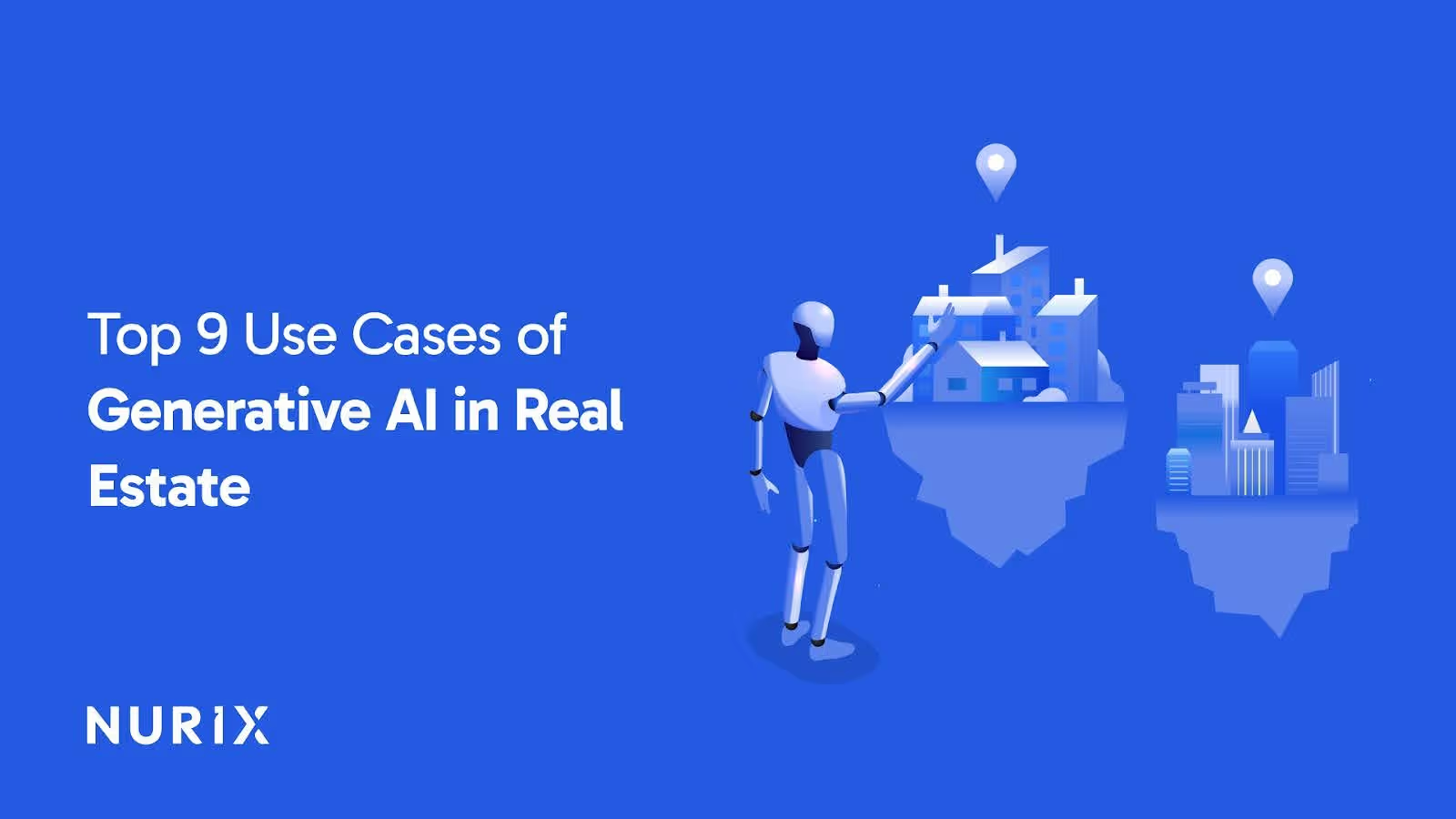The real estate industry is standing at a crossroads where traditional practices meet advanced technology. The pressure to stay competitive and meet growing client expectations has never been greater, pushing firms to rethink how they operate. Generative AI in real estate is carving a new path, offering capabilities that extend beyond basic data analysis and automation.
Real estate professionals have long sought ways to improve sales outcomes and improve customer experiences, but often found existing tools falling short of practical needs. Now, generative AI in real estate presents new opportunities to streamline workflows, personalize engagement, and reduce time-consuming tasks, which is turning heads across the sector.
This blog will explore the top 9 use cases where generative AI is making a tangible difference, from property listing creation to market forecasting and risk evaluation.
Takeaway
- Generative AI Enables Original Content Creation: It goes beyond analyzing data to produce high-quality, context-aware content that strengthens marketing, customer engagement, and operational workflows.
- Measurable Impact Drives Widespread Adoption: Real estate firms are seeing clear gains in speed, accuracy, and scale, from accelerated listings to enhanced virtual tours and predictive maintenance.
- Data-Driven Decision-Making Enhances Confidence: AI synthesizes extensive data for precise valuation, risk assessment, and forecasting, cutting human bias and reducing costs for smarter investment choices.
- Navigating Complexity is Essential for Success: Managing data integrity, transparency, compliance, cybersecurity, and domain-specific adaptations is critical, demanding skilled teams and careful vendor selection.
- Emerging Technologies Expand AI’s Reach: Autonomous AI decisions, blockchain transactions, IoT integration, AR visualization, and real-time analytics signal deeper control and competitive edge in real estate management.
What is Generative AI?
Generative Artificial Intelligence (AI) represents a branch of machine learning that creates original content rather than simply analyzing or predicting outcomes. Unlike traditional AI systems that classify data or make predictions, generative AI produces new material, including text, images, audio, video, code, and other digital content in response to user prompts.
This technology operates by training on massive datasets to identify patterns, structures, and relationships within existing content. Through deep learning models and neural networks, generative AI learns to generate statistically probable outputs that can appear remarkably human-like. The system creates content by understanding contextual dependencies and generating new material that resembles its training data without being identical to it.
Core Features of Generative AI in Real Estate
Generative AI in real estate offers capabilities that go beyond basic automation, offering new ways to handle complex tasks and data. Here are the key features that set it apart in this sector:
- Content Generation Across Formats: Creates original text, images, audio, video, and code from simple prompts, handling multiple data types with human-quality output.
- Pattern Recognition and Learning: Detects complex patterns in vast datasets, learns from unstructured data via unsupervised methods, and improves continuously with new inputs.
- Natural Language Processing: Understands conversational nuances to generate relevant, human-like responses and sustain coherent, extended dialogues.
- Automation and Scalability: Automates repetitive content creation, coding, and documentation tasks around the clock, reducing manual workload.
- Personalization at Scale: Analyzes user behavior to produce personalized content and experiences for large audiences efficiently.
- Data Synthesis and Insight Extraction: Generates synthetic data for training, analyzes unstructured information, and compiles detailed reports from multiple sources.
- Cross-Industry Adaptability: Applies learned models across sectors with minimal retraining, customizing for domain-specific needs and integrating into existing workflows.
- Real-Time Output: Delivers prompt responses and content on demand without relying on pre-made templates, handling complex requests quickly.
- Consistent Quality Control: Ensures uniform tone and style with predictable results, supported by feedback-driven refinement.
- Foundation Model Architecture: Built on versatile, large-scale models using transformer techniques, allowing fine-tuning for specialized real estate applications.
When the impact shows up in daily work and bottom lines, real estate firms naturally take notice.
Here’s a bit more information: What is Generative AI vs AI: Understanding the Differences
Why are Real Estates Jumping on the Generative AI Train?
Real estate is stepping up with generative AI because its impact is measurable in ways that matter: speed, precision, and scale. The shift speaks to solving deeply rooted challenges with fresh, actionable tools. Here’s why the momentum is gathering:
- Massive Market Growth Opportunity: The global AI real estate market, valued at $2.9 billion in 2024, is projected to reach $41.5 billion by 2033, representing a 30.5% CAGR that signals unprecedented expansion potential.
- Operational Cost Reduction at Scale: AI-driven property management platforms boost rental income by up to 9% while cutting maintenance costs by 14%.
- Customer Demand for Digital Experiences: Virtual staging powered by AI increases property inquiries by 200% compared to traditional methods, directly addressing buyer expectations for immersive digital experiences.
- Competitive Advantage Through Data Intelligence: AI tools predict property price trends with 95% accuracy.
- Regulatory Compliance and Fraud Prevention: AI detects listing manipulations and flags Fair Housing compliance, while computer vision spots fraudulent images and descriptions to protect firms from penalties.
- Workforce Productivity Amplification: AI enhances agent capabilities by automating routine tasks like lead qualification and client communication, freeing professionals to concentrate on negotiation and relationship building.
- Market Timing and Forecasting Precision: Predictive analytics analyze demographic, economic, and social data to accurately forecast market shifts, enabling proactive pricing, optimal investments, and early identification of hotspots.
The reasons behind this shift are clear enough. Now, let’s get into the specific ways generative AI is making a real difference in real estate operations.
If you are on the look out for some of the best AI tools real estate agents are using, click on this interesting read: Top AI Applications Every Real Estate Agent Needs for Success
Top 9 Use Cases of Generative AI in Real Estate
Generative AI in real estate is proving its value across a range of practical applications that deliver clear results. Here’s a look at the key use cases where it’s making its mark:
- Property Data Summarization
Property listings can be created in minutes rather than hours through AI-powered content generation systems. These platforms analyze property features, location data, and market characteristics to produce compelling, SEO-optimized descriptions.
What it does for the Real Estate industry:
- Time Efficiency: Reduces description writing time from 30-60 minutes to under one minute per property.
- Content Quality: Generates consistent, professional-grade descriptions that highlight unique features and appeal to target buyers.
- SEO Optimization: Automatically incorporates relevant keywords like location-specific terms and property features to improve search visibility.
- Virtual Property Tours and Interactive Experiences
AI-powered virtual reality systems create immersive 3D property tours that allow potential buyers to experience properties remotely. These systems can adapt in real-time based on user interactions and preferences.
What it does for the Real Estate industry:
- Global Accessibility: Breaks down geographical barriers, allowing international buyers to tour properties without travel costs.
- Personalized Experience: AI adapts tours based on user behavior, highlighting rooms or features that capture the most attention.
- Cost Reduction: Eliminates the need for multiple physical showings and reduces scheduling conflicts for agents.
- Predictive Maintenance for Properties
AI systems analyze building data from sensors and IoT devices to predict equipment failures before they occur. This proactive approach transforms traditional reactive maintenance models.
What it does for the Real Estate industry:
- Downtime Prevention: Predicts HVAC, plumbing, and electrical issues weeks before failure, avoiding emergency repairs.
- Cost Management: Reduces maintenance costs by up to 30% through proactive scheduling and preventing major system failures.
- Tenant Satisfaction: Maintains optimal building conditions by preventing disruptions to heating, cooling, and essential services.
- Lead Generation and Qualification
AI analyzes customer behavior patterns, online activities, and engagement metrics to identify and score high-quality leads. These systems prioritize prospects most likely to convert.
What it does for the Real Estate industry:
- Lead Prioritization: AI scoring systems rank leads based on conversion probability, allowing agents to focus on qualified prospects.
- Response Speed: Automated systems respond to inquiries within seconds, preventing leads from going to competitors.
- Conversion Optimization: Predictive analytics increase lead-to-client conversion rates by 10-15% through targeted engagement strategies.
- AI-Powered Property Valuation
Automated Valuation Models (AVMs) use machine learning to analyze comparable sales, market trends, and property characteristics to provide accurate property valuations in real-time.
What it does for the Real Estate industry:
- Valuation Speed: Provides property estimates in minutes compared to days or weeks for traditional appraisals.
- Market Accuracy: Reduces valuation errors through analysis of comprehensive market data and trends.
- Investment Confidence: Delivers objective, bias-free valuations that support informed pricing and investment decisions.
- Intelligent Chatbots and Customer Service
AI chatbots handle tenant inquiries, schedule appointments, and manage maintenance requests 24/7. These systems integrate with property management platforms to provide smooth service.
What it does for the Real Estate industry:
- Availability: Provides round-the-clock customer support, capturing leads, and resolving issues outside business hours.
- Operational Efficiency: Automates up to 80% of routine inquiries, freeing property managers for complex tasks.
- Tenant Retention: Improves response times and service quality, leading to higher tenant satisfaction and retention rates.
- Market Analysis and Investment Insights
AI processes vast amounts of market data, economic indicators, and demographic trends to identify investment opportunities and predict market movements.
What it does for the Real Estate industry:
- Trend Identification: Detects emerging market opportunities before they become widely recognized by competitors.
- Risk Assessment: Analyzes market volatility and economic factors to predict potential risks and returns.
- Strategic Planning: Provides data-driven insights for acquisition, development, and disposition decisions across property types.
- Document Automation and Contract Management
AI systems automatically generate contracts, extract key terms from leases, and manage document workflows. These tools streamline legal processes and reduce administrative burden.
What it does for the Real Estate industry:
- Processing Speed: Cuts document processing time by up to 50% through automated contract generation and review.
- Error Reduction: Decreases manual errors through automated data extraction and validation.
- Compliance Assurance: Automatically flags potential legal issues and ensures contracts meet regulatory requirements.
- Fraud Detection and Risk Management
AI systems analyze transaction patterns, document authenticity, and applicant information to detect fraudulent activities in real estate transactions and tenant applications.
What it does for the Real Estate industry:
- Fraud Prevention: Detects advanced fraud schemes, including document manipulation and identity theft, in real-time.
- Financial Protection: Reduces financial losses from fraudulent transactions and problematic tenants through predictive risk assessment.
- Regulatory Compliance: Maintains compliance with fair housing laws and anti-fraud regulations through objective, data-driven screening processes.
With a clear view of where generative AI is making tangible impacts, it’s equally important to consider the practical challenges that come with adopting this technology in real estate.
Key Considerations When Implementing Generative AI in Real Estate
Implementing generative AI in real estate brings unique challenges and decisions that directly affect outcomes. Here’s what experienced hands focus on:
- Data Integrity and Access: Success depends on accurate, current property data aggregated from sources like public records, listings, IoT sensors, and CRM platforms. Solutions must address fragmented datasets and control access securely for reliable results.
- Transparency and Bias Mitigation: Models need explainable outputs, audit trails, and protocols for interpreting recommendations, especially under regulatory review. Regular testing is required to eliminate bias, particularly for Fair Housing Act compliance in marketing, tenant selection, and lending.
- Cybersecurity and Privacy: Expansion of automated analytics amplifies the risk of breaches and privacy violations. Effective encryption, vulnerability assessments, and management of legal consent for sensitive data are mandatory.
- Customization and Domain Fit: Off-the-shelf models often require refinement for industry terminology, local regulations, lease structures, and document types unique to real estate. Domain adaptation is critical for practical results.
- Specialist Talent and Change Management: Integration requires teams skilled in machine learning, real estate processes, and compliance. Talent shortages may necessitate external partnerships, while clear communication and measurement strategies help overcome staff resistance and track ROI.
- Vendor Evaluation and Integration: Providers vary in product reliability, compatibility, and support. Firms must assess platform flexibility, migration demands, outage records, and ongoing service to safeguard project outcomes.
- Ongoing Regulatory and Model Updates: Rapidly shifting laws on data, advertising, and financial controls demand continuous legal review, updates to algorithms and disclosure protocols, and regular retraining to prevent performance drift or model decay.
With the right groundwork laid, what’s next on the horizon for generative AI in real estate points to deeper capabilities and broader applications that will demand attention.
Future Trends in Generative AI in Real Estate
The horizon for generative AI in real estate is lined with advancements that sharpen focus and broaden impact. These trends point to where attention and investment are moving next:
- Autonomous agentic AI systems: These advanced agentic AI platforms will independently make pricing, investment, and operational decisions, allowing fully automated execution of routine and complex processes, cutting manual workload and accelerating response to market changes.
- Blockchain-powered smart contracts and property tokenization: With AI managing and validating digital transactions, smart contracts will automate lease agreements, rent payments, and ownership transfers, improving transaction speed and reducing risk of fraud, while tokenization expands investment access to a broader group.
- IoT-enabled predictive building management: AI will analyze data from a vast network of sensors to spot maintenance needs before failures occur, optimize building performance, and automatically adjust environmental conditions, deepening personalization for tenants and helping owners control costs and energy use.
- Augmented reality and generative AI for visualization: AI-driven AR tools will deliver detailed, interactive property walkthroughs and instant virtual staging in response to buyer preferences, fundamentally changing how properties are marketed and experienced, resulting in faster, better-informed decisions.
- Conversational voice AI operations: AI interfaces will manage prospect interactions, qualify leads, process maintenance requests, and carry out administrative instructions using natural language, reducing response times and freeing staff from repetitive communications.
- Edge computing for real-time analytics: By processing data on-site, edge AI enables immediate responses to safety threats and system failures, ensures regulatory compliance for data privacy, and delivers continuous building management, even during network outages.
- Accelerated market growth: With generative AI in real estate projected to exceed $1.3 billion in market size by 2034, and ongoing increases in PropTech investment, the technology’s commercial relevance and adoption rate are rapidly escalating.
- Smart city and urban planning integration: Generative AI’s predictive analytics will extend beyond individual assets, supporting city-scale decisions on development, infrastructure, and compliance, enabling more agile and data-driven growth strategies for urban real estate.
Conclusion
Generative AI in real estate is far from a simple tool; it's becoming a quiet force redefining how value is delivered across the property sector. Through pragmatic applications, it reshapes workflows and decision-making without screaming for attention. Success lies in knowing where and how to apply these capabilities to meet business goals with precision.
For organizations ready to translate potential into real-world impact, Nurix AI offers advanced solutions rooted in industry-specific challenges. Nurix AI’s generative AI platform stands out by offering features designed specifically for real estate challenges:
- Smart Lead Capture: Instantly engages website visitors with natural, conversational interactions that feel personalized and approachable.
- Smart Buyer Qualification: Gathers key buyer details like investment intent, location preferences, budget, and timelines during the first interaction.
- Intent-Based Prioritization: Automatically identifies high-intent, pre-approved buyers and routes them swiftly to sales teams for timely follow-up.
- Smooth CRM Integration: Syncs buyer profiles and leads directly into existing CRM systems, eliminating manual data entry and smoothly integrating with scheduling tools.
- 24/7 Multi-Channel Availability: Provides round-the-clock engagement across text, email, and voice channels without adding operational overhead.
These capabilities ensure Nurix AI doesn’t just provide technology but delivers a partner attuned to the realities of real estate operations. Get in touch with us!








